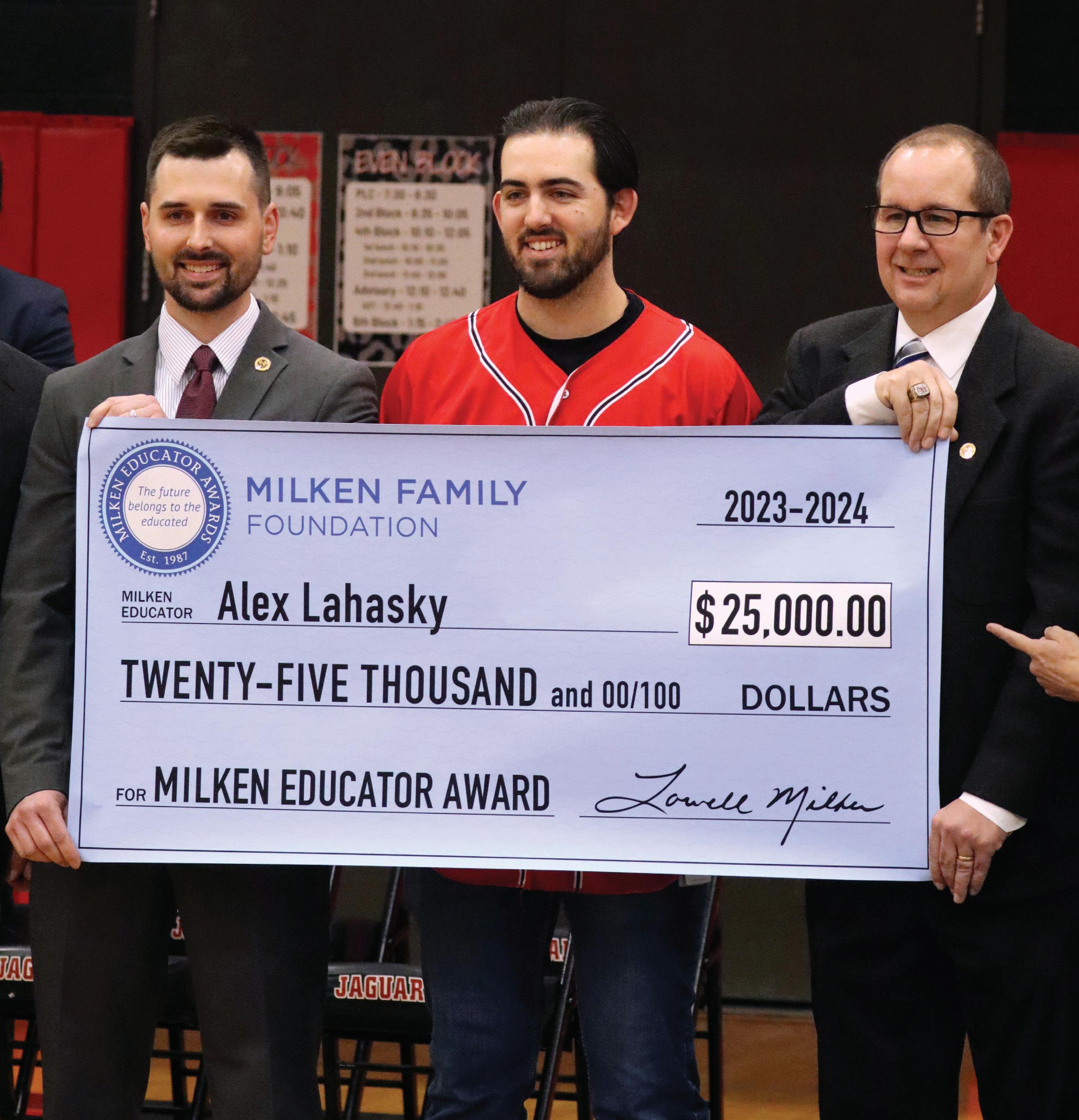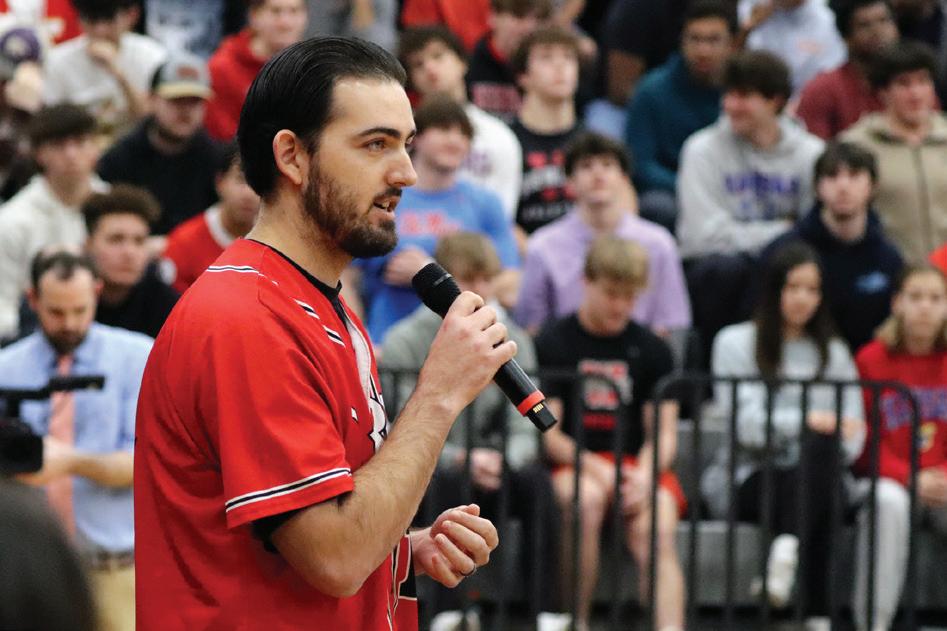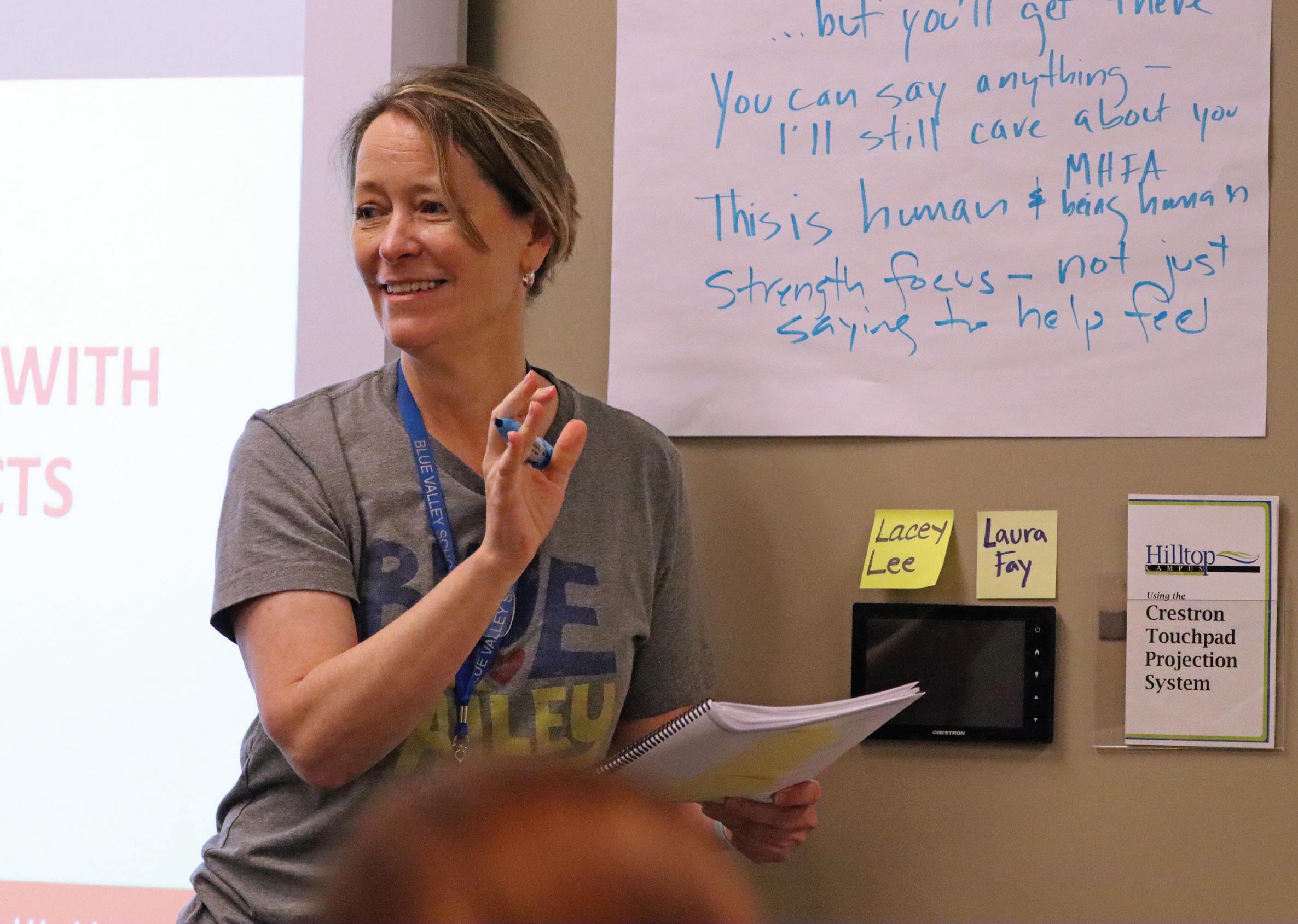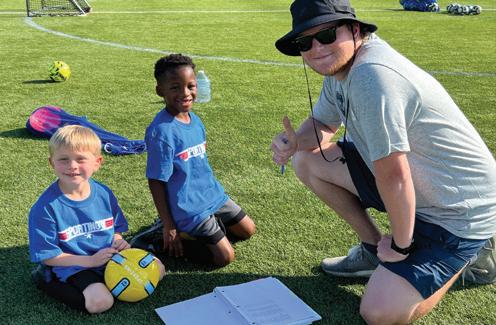

THE
GOODBYE TO FINES.
A Messagefrom the Superintendent
As we find ourselves halfway through the second semester, time is swiftly passing and spring is on the horizon, marking the final stretch of the academic year. I’m grateful to our dedicated educators and support staff for their unwavering commitment to educating our students, especially during these last crucial weeks. Blue Valley’s reputation as a high-quality school district is upheld by their tireless efforts.
Academic achievement remains a priority in Blue Valley, and we continue to celebrate all of our students as #ChampionsofLearning. Our teachers and district leaders embrace data and utilize it to inform teaching and future initiatives. State assessments are always a useful checkpoint for us to see where our students are and the growth they are achieving. The 2023 state assessments showed growth in all areas with a remarkable 5% increase in math scores.
As we celebrate our students’ academic progress and achievements, it’s also important to provide real-world learning opportunities. Blue Valley Academy has embraced this through its new construction and auto-tech spaces. We are excited that we were able to expand our program space and continue to enhance the experiences that lead to success inside and outside of the classroom. The community’s support of Bond 2020 made the construction of the auto-tech space possible. Thank you for understanding the importance of real-world opportunities that translate beyond the classroom.
I would be remiss not to mention and continue to share my resounding appreciation for the community’s approval of Bond 2023. It’s been almost a year since this $250 million no-tax-rate increase bond passed. Several projects will begin this summer, including the construction of an additional auxiliary gym at Blue

Valley West, the renovation of athletic and program spaces at Blue Valley North and design work for Leawood Elementary’s and Cedar Hills Elementary’s mobile removal and additions. This is just the start of many exciting bond projects coming down the pipeline.
Our team has been hard at work designing the next middle school which will be built in the Southwest attendance area. While the school won’t open until 2026, there is a lot of work to be done beforehand. We value student input and have ensured their involvement from day one of the design process. As bond projects develop, we will continue to share glimpses with our community members as we know these renovations and additions wouldn’t be possible without you.
I know how important it is for our Blue Valley community to stay informed, including about legislation issues impacting our schools. As the Kansas Legislature is halfway through its session, please take a few minutes to visit bluevalleyk12.org/legislative to review our legislative positions and understand why we advocate for what’s in the best interest of our students, educators and community.
As we wrap up the school year, I will leave you with this reminder: Our staff remains committed to providing students with an exceptional education, unwavering support in and outside of the classroom and experiences that will lead them to a bright future.











BlueValley’s
2024 LEGISLATIVE PRIORITY POSITIONS
Legislative priorities, approved by the Blue Valley Board of Education, are a crucial aspect of advocating for the best interests of our students, educators and the community as a whole. These priorities are carefully chosen issues that we believe require attention and action from local, state, or federal legislators. The purpose is to ensure that the policies and laws governing education align with the needs and goals of our district. By establishing legislative priorities, we aim to influence decision-makers to address key challenges, allocate resources effectively, and enact policies that support the success of our students.

BLUE VALLEY WEST TEACHER WINS
Milken Educator award, $25,000 prize

In a heartwarming twist of fate, Blue Valley West social studies teacher Alex Lahasky found himself seated in the same bleachers during an all-school assembly where he once sat as a student. But this time he sat among his students and colleagues as they all listened to Lowell Milken, chairman of the Milken Family Foundation, announce he was in attendance to surprise a deserving teacher with a Milken Educator award.
As Milken prepared to name the winner, Lahasky leaned over to one of his students and playfully elbowed them saying, “You think it’s me?” This moment of irony isn’t lost on Lahasky as never in his wildest dreams did he think he would be the recipient.
Seconds later, to Lahasky’s surprise, Milken called his name. As Lahasky walked down the bleacher steps to a roar of applause to accept the award — and a $25,000 check — he began processing

what was occurring — he had just won a Milken Educator award.
The Milken Educator Awards, considered to be the Oscars of teaching, was founded in 1987 by Milken and rewards early-tomid-career educators nationwide who represent the top 1% of the teaching profession for the quality of their teaching, leadership, engagement with families, and the community and the positive impact they will have on future generations.
Candidates are identified through a confidential selection process and reviewed by a state-appointed panel. Recipients receive $25,000 that can be used without restrictions.
Since its inception, the Milken Educator awards have honored almost 3,000 educators and awarded $75 million in financial prizes.
Even as Lahasky accepted an award designated to celebrate him and his teaching, he humbly thanked his colleagues.
“Thank you for the honor,” Lahasky said. “Thank you to the members of my department who continue to push me and inspire me… I went to school here, and the remark that was made about how everyone sitting up here has a teacher that inspired them or impacted them, I’m so fortunate that not only do I have those teachers and they are in the building, they are also my colleagues. They’ve taught me how to be a teacher and pushed me to be better every day.”
While early in his teaching career, Lahasky has already started to leave behind a legacy. Just as his former teachers-turnedcolleagues inspired him, Lahasky inspires his students daily.
“I think one of the biggest ways he’s inspired me is I definitely want to do something dedicated toward helping others,” said Sarah Jiang, a junior at Blue Valley West. “There’s just so much he does for the school.”
Kripa Gauba, a junior at Blue Valley West, said the relationships Lahasky forms with his students are special.
“Forming relationships and being able to connect with people on a personal level is so important in any profession, whether it’s teaching, medicine or law,” Gauba said. “I think the skills he teaches us are not only applicable to the history field, but also the real world.”
Blue Valley Academy challenges stereotypes and inspires success THINK DIFFERENTLY:
When Fana Galla found out she wouldn’t have enough credits to graduate from Blue Valley North, she had a choice: Stay an extra year or transfer to Blue Valley Academy.
As she contemplated her options, she thought about the stigma surrounding the Academy.
“People said it was a bunch of troublemakers, and people that go there aren’t intelligent and it’s a weird, gloomy school,” Galla said.
Walking into the Academy on her first day, Galla realized those assumptions couldn’t be further from the truth.
Music plays over the loudspeakers as the school day begins at the Academy. On this particular day, “You Will Be Loved” by Maroon 5 sets the tone: this school is home; you are welcome and cared for here. Teachers stand outside greeting students, asking how they are, and thanking them for showing up, not just to school but for themselves. The main entry opens to expansive windows, light billowing in from outside.
Common spaces are sprinkled throughout the building, allowing for collaboration and friendships to develop among students and staff. During lunch, a few students gather in a small game room where ping pong and pool tables live. They mingle for a few minutes before heading off to class.
Galla, a senior, recalls her first day at the Academy, noting how bright it was and how kind the teachers were.
“School became fun for me,” Galla said. “Instead of something like, ‘I don’t want to get up in the morning,’ I’m excited to come to school.”
The program, founded in 1998, is home to approximately 100 students who have transferred from Blue Valley’s traditional high schools. High school intervention teams recommend students who then go through an interview process in which they agree to remain committed to graduating and dedicate themselves to making positive changes.
The program was designed to serve students who aren’t experiencing the level of success in a traditional school setting the
district envisions for all students. Today, Blue Valley Academy continues to be a place for students who benefit from extra attention, support and a different instructional environment. The program centers around three guiding principles: meaningful relationships, academic rigor and real-world learning.
The Academy offers smaller class sizes, allowing for more personalized and one-on-one instruction with teachers. The program holds the same standards as any other school in the district, expecting its students to meet high academic standards.
“It’s amazing to see students, once they get comfortable in their environment, fully realize the power within themselves,” said Scott Kreshel, Blue Valley Academy principal. “That confidence starts to bolster, and they take ownership of their studies. They take ownership of their future.”
From drifting to soaring
Before transferring to the Academy, Galla felt like she was drifting.
“Coming here, it feels warm and inviting,” Galla said.
Galla takes advantage of real-world learning opportunities at the Academy, including automotive and culinary classes. Those experiences allow Galla to open her mind to the possibilities after high school. She plans to attend Johnson County Community College and earn her pilot’s license.
For Galla, the Academy has become a home away from home.

“I wish [the community] could see the Academy through my eyes and that people come here mainly because of credits or because they personally or emotionally didn’t connect with their home school,” Galla said. “When I look around at my peers, I see musicians and intelligent people — people that are going to get far in life.”
‘Greatest educational opportunity ever’
Frank Christian, a senior who transferred from Blue Valley High, didn’t enjoy school. To improve his mental well-being and grades, Christian decided it was time to make a change.
Since doing so, Christian said, his experience at The Academy has been filled with joy.
“I finally enjoy coming to school mainly because the staff is wonderful and welcoming, especially in the morning when all the teachers greet you,” Christian said. “It brings a smile to my face.”
Christian has taken advantage of the real-world learning at the

Academy by taking power tools and small engines through the Academy’s new auto-tech program, and a geometry and construction class.
After high school, Christian hopes to pursue a career in construction and feels like the Academy has prepared him to be successful in that field.
“From my experience, it has been the greatest educational opportunity I’ve ever had,” Christian said.
‘It feels like a family’
On Marni Rosenberg’s first day at Blue Valley Academy, she wanted to leave. The Academy’s counselor Jennifer Freestone encouraged her to give it a week and Rosenberg is glad she did.
Before the Academy, Rosenberg’s relationship with school was poor. She thrived academically but struggled socially. That has changed.
“Every day, the teachers are smiling and greeting you at the front
door,” Rosenberg said. “You feel like you can go to them for anything, school-related or not. They’re patient, and they care. It feels like a family.”
“It’s amazing to see students, once they get comfortable in their environment, fully realize the power within themselves.”
SCOTT KRESHEL
BLUE VALLEY ACADEMY PRINCIPAL
Rosenberg, a senior who transferred from Blue Valley West, has developed relationships with many staff members at the Academy who have taken time to discuss potential career opportunities with her. She is still deciding if she wants to pursue a career in criminal justice or work with kids.
“Don’t judge a book by its cover,” Rosenberg said.
“...It’s important for people to know that the Academy is not what people make it out to be. These people are changing kids’ lives by helping them be able to graduate, helping them get jobs, helping them move on for their future.”
When students first arrive at the Academy, many feel hopeless. This opportunity allows them to feel hopeful.

Kreshel said as students graduate, he hopes they become excited about their future and realize the skills and confidence they’ve gained to help them take on what’s next.
“Don’t doubt some of our most challenging kids because they’re the ones that figured out how to break the rules,” Kreshel said. “They haven’t conformed to some of the things that, on the surface, are the right structure. They look at things a little differently and have some risk-taking ability that when it shines, they can reach some pretty awesome heights.”

“Kids deserve it”
Blue Valley’s commitment to empowering educators with mental health training
In the hallways of Blue Valley schools, where the echoes of laughter and learning abound, the silent struggle of a student can often go unnoticed. Mental health challenges can be subtle, showing up as small changes in behavior or quiet moments in the classroom.
In a powerful initiative to support Blue Valley students’ mental health, district educators have partnered with Youth Mental Health First Aid (YMHFA) to gain life-saving tools for students in mental health crises. With over 382 individuals trained, Blue Valley aims to empower educators to address and navigate conversations about mental health with students.
The training is triage–equipping educators with the essential steps
to getting a student to professional help. Similar to CPR training, where someone who is not a medical professional can perform the first steps to save someone’s life, Mental Health First Aid guides educators to notice the signs of a student in a mental health crisis.
“We’re teachers, we aren’t trained psychologists, so we don’t necessarily have all those tools and tricks in our tool bag,” said Katie Lesando, Blue Valley Southwest chemistry teacher and colorguard coach. “When you’re in that life or death situation, sometimes it’s scary, and you don’t know what to do, and that training really builds your confidence and gives you those tools.”
Mental health has been at the forefront of conversation in Blue Valley since the pandemic, but finding training with fidelity was

crucial to keeping this initiative sustainable. Kelly Wessel, Blue Valley’s Director of Retention and Recruitment, went through the training herself and committed to embedding supportive mental health resources within the district’s culture.
“This job is about building the potential and curating and nurturing the development of a human being,” Wessel said. “Students’ emotional growth and emotional well-being are absolutely pivotal for them to even be in a position where they can focus and thrive and learn all of the critical thinking skills, reasoning skills and everything that they learn in school so that they can go out and find joy in their lives, whatever that looks like.”
Coaches and club sponsors — who spend a significant time building rapport with students — were the first to receive the training. Dedicating six hours of their professional development time to the training, these educators immediately saw the paradigm shift in mental health and the right ways to connect their students to resources.
“I had a student literally come to me the very next day [after training], and this particular student had struggles in the past and had come to me with struggles in the past, and I always felt very nervous that I was saying the wrong thing and I didn’t know the right thing to say,” Lesando said. “The training kind of gave me a way to put my own emotions aside and just really be there for the kid and ask the right questions and really try to figure out what’s going on.”
In the United States, one in five youth will have a mental disorder that significantly impacts their life. As students navigate their educational journey, having a network of trusted adults can be the first step to advocating for their mental health.
“I have a few students that if that [training] weren’t in place--if they weren’t coming and being able to vocalize to me or to a librarian, or others in the building, they wouldn’t come to school,” said Adam Grindstaff, the teacher and sponsor of the artificial intelligence club at Lakewood Middle. “Some kids know when they have safe people that they can come to and they trust–they want to come to school. I honestly feel like this approach–this mental health first aid–has helped them.”
Training events of this magnitude require trainers to be brought in from all over the state–until now. Blue Valley has become a pioneer, nationwide, as one of the first districts to increase its internal capacity of trainers. “With 17 Youth Mental Health First Aid instructors, the district, — thanks to the Blue Valley Educational Foundation — can now use these individuals to offer the courses in September and April for the next three years, resulting in approximately 300 trained staff members per year.
“We do not want our young people to feel alone and isolated and that nobody will understand or nobody can help them because it is a scary place to be when you are dealing with a mental health challenge,” Wessel said. “Even if we just train one more person or ten more people, it’s worth it because you have no idea who then that person is going to help.”
With an influential initiative like Youth Mental Health First Aid, the district hopes to serve as a beacon of light across Kansas, pushing for other districts to replicate the training for their educators.
“I think that Blue Valley is a lighthouse situation,” Grindstaff said. “This is my 27th year, and I have never seen a district go out and put this importance on mental health first aid. Kids deserve it.”

Early reading intervention leads to Blue Valley student’s literacy success

Brayden Mills began his kindergarten year like any other kid. He was ready for the new experiences, friends and learning he was about to embark on. As the first weeks of school commenced, Michelle Huffman, a Harmony Elementary kindergarten teacher, noticed Mills didn’t know all his letters. When he started the year, he knew 11 letters.
“Typically, students come in knowing most, if not all, letters,” Huffman said.
Huffman checked to see how many letter sounds he knew and determined he only knew a few. After students took the Acadience assessment, the district’s reading diagnostic screener for grades kindergarten through fifth, at the beginning of the school year, Huffman reviewed her students’ data to determine who might need additional reading support.
During a professional learning community meeting, Huffman shared with her team Mills’ struggles in reading and his assessment scores. Further discussions led Jane Price, Harmony Elementary’s reading specialist, to assess a group of students, including Mills, who showed signs they needed additional support.
“I did additional diagnostic tests that assessed Mills’ phonemic awareness and phonics skills, and it showed that it wasn’t just an outlying score,” Price said. “He was missing that sound-symbol relationship, he was missing his beginning sounds, and he was unable to segment words into sounds.”
Through whole and small group interventions and additional
reading support with Price, Huffman noticed a significant improvement in Mills’ foundational reading skills by October. The energy Mills brought to school quickly became focused on learning to read. Mills hasn’t needed reading intervention during the second semester.
“He’s doing amazing,” Huffman said. “He went from being in the below-level group to now, he’s in my high-average group. Coming from a kid who hardly knew any letters or sounds, now he can write four sentences. I can give him a decodable book, and he doesn’t have to stretch out the sounds. He can just read it.”
Early reading interventions like this are key for struggling students to close gaps in skills for literacy as those early skills serve as the building blocks for more complex skills.
Blue Valley staff is trained to administer screeners, diagnostic assessments and formative assessments to identify the needs of their students, then dig into data which helps them drive instruction. Using these tactics, educators work together to identify early when a student is struggling and ensure they receive the support needed for success.


“It’s important for all educators to know how to identify a student who is struggling with reading and incorporate reading interventions,” said Jennifer Luzenske, Blue Valley’s director of curriculum and instruction. “Educators utilize their data to pinpoint the skills a student needs to learn or practice for mastery and automaticity.”
The progress students experience isn’t possible without the teamwork among staff members. Reading specialists, English for speakers of other languages (ESOL) teachers and resource teachers all play a vital role in supporting students with additional interventions while collaborating with classroom teachers.
This collaboration ensures consistent support is provided to every student.
“We can’t do it alone,” Huffman said. “If we can get early intervention in place, that’s the success story we want. If we help them in kindergarten, they may not ever need intervention because we were able to fill those gaps.”
Huffman and Price said being able to watch Mills’ confidence grow is one of the reasons they became educators.
“That’s why we do what we do,” Huffman said. “It’s seeing him blossom into this amazing student and seeing his confidence. That’s what we want to see. It’s what makes our hearts warm.”
Tyler Mills, Brayden Mills’ dad, said it has been great to see his son work through sounding out words and self-teaching, demonstrating
a new level of reading comprehension.
“You realize how isolating the world can be when you’re not able to make sense of the words all around us,” Tyler Mills said. “It’s been fun hearing him reading street signs and billboards from the back seat and connecting all the puzzle pieces.”
Tyler Mills said the emphasis the district places on early interventions and student support is the reason the Mills family lives in Blue Valley.
“Blue Valley schools are truly world-class, from the teachers and administration to having such a strong peer group to positively motivate each other,” Tyler Mills said.














DoYouKnowaCurrent(or Aspiring)SoccerPlayer?














SportingBlueValleyHas SummerOptionsForYou!
Oursummercampsareforallages4+thatwanttoplayoutside,beattheheat,andlearnsoccerfrom ourprofessionalcoachingstaffwhilehavinga blast withfriends(andmaybemakesomenewones!) Allsummercampsincludeat-shirt,ball,andmore.OurPremierTryoutsstartonJune7th,andare heldforall2,000+playersthatplayorwanttoplayinouryear-roundcompetitivePremierprogram. Choosewhichoneisbestforyoubelow!
PRE-TRYOUT:
ForallU8-U19playersinterested intheSBVPremierProgram.Extendyourtryoutby fourdaysinfrontofourdecision-makingcoaches!
MINI-KICKERS:
Forall4-6yearoldplayers lookingforafunwaytospendtheirsummer!Four,2hoursessionsofcreativegamesandfuncoaching.
HALF-DAY:
Forall7-14yearoldplayerslooking
forafunwaytospendtheirsummerandgetbetter atsoccer.Ourprocoachesteachthegame throughfungamesandcreativeskillsessions.
GOALKEEPER:
Designedtodevelop theskillsofaGKwithtrainingonsetpieces, angleplay,footwork,diving,aerialballs,&more.

WHO: WHAT: PREMIER:
AllcompetitiveplayersU8-U19.Wehave teamsofallskilllevels.
SBVPremierisouryear-roundcompetitive programcoachedbyprofessionalcoaches. Theprogramisbasedonskill,andwehave multipleteamsineachagebracket.Players moveupbetweenteamsastheygetbetter.
•TryoutsJune7-9th,2023
•Yearround-Fall,Winter,Spring
•Atleast2xweeklypractices
•Gamesontheweekends
•Tournaments
•Heartland,USYSE64,ECNL,ECRL
SBVSPRINGSKILLSCLUB
isalsoopenbutstartsonMarch22.GotoSBVSKILLS.COM

WE SUPPORT BLUE VALLEY PUBLIC SCHOOLS

Proud to be Kansas City’s TOP HOSPITAL for Patient Safety

Helping You feel whole Expert Healthcare in Your Neighborhood
AdventHealth South Overland Park is here for you when you need us. Whether you are looking for a primary care provider, are expecting a new baby, need surgery or have an emergency, we want to care for you at all phases of life.
HOSPITAL at 165th and U.S. 69
